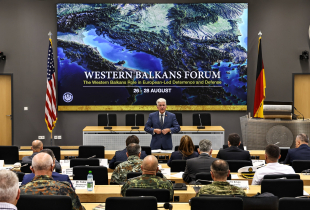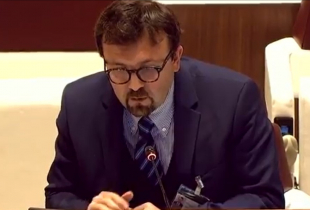
The Borderization of Georgia’s Breakaways as a Tool of Russia’s Long-Term Struggle with the EU and NATO.
Abstract
After the collapse of the Soviet Union, the bipolar international order disappeared, while a number of independent countries were born. When Vladimir Putin took power in Russia, he systematically corrected what he believed were the failures leading the Soviet Union to collapse. The changes he implemented allowed Russia to return to the stable policy aimed at restoring its position and, in accordance with the Primakov’s doctrine, the international recognition of the Russian right to maintain its sphere of influence in the so-called “Near Abroad” states. The so-called color revolutions appearing in the post-Soviet space caused unwelcome developments in the stabilization policy and the “Near Abroad doctrine.” Russia quickly recognized these events as a product of the United States and other Western powers, which pose a vital threat to its national security. As a result of the deterioration of Russian-Georgian relations, sporadic armed incidents between Georgia’s armed forces and separatists from the republics of South Ossetia and Abkhazia, as well as Russia’s so-called intervention troops, have returned. On August 26, 2008, after the so-called August War, Russia recognized the independence of Abkhazia and South Ossetia, which changed the geopolitical situation in the South Caucasus.
Since the endorsement of the Six-Point Ceasefire Agreement of 2008, Russian-Georgian relations and the situation of both breakaway republics disappeared from world politics, which greatly reduced importance of the Russo-Georgian constructive conflict regulation. This does not mean that the situation has completely stabilized, or the conflict can be categorized as frozen. Quite the opposite, the so-called borderization process of the “sovereign republics” is not only progressing, but between 2019-2021 has considerably accelerated. This process is accompanied by protests of Georgian NGOs and residents living in areas affected by the controversial actions of the de facto actors and the Russian Federation Border Guards.
This paper does not aspire to present the Georgian-Russian relations between 2008-2022. Its aim is to present the forgotten but still ongoing process of borderization, which is a violation of international agreements and laws. The author also seeks to point out the possible risks hidden in a still progressing process.
About the Author
Mariusz Rzeszutko has a Ph.D. in security sciences and is a theoretician and practitioner with a mission background. He has worked in ministries, international organizations, and private sector companies and is particularly interested in protracted conflicts, national and ethnic minorities, and countries’ stability.
The George C. Marshall European Center for Security Studies
The George C. Marshall European Center for Security Studies in Garmisch-Partenkirchen, Germany is a German-American partnership and trusted global network promoting common values and advancing collaborative geostrategic solutions. The Marshall Center’s mission to educate, engage, and empower security partners to collectively affect regional, transnational, and global challenges is achieved through programs designed to promote peaceful, whole of government approaches to address today’s most pressing security challenges. Since its creation in 1992, the Marshall Center’s alumni network has grown to include over 15,000 professionals from 157 countries. More information on the Marshall Center can be found online at www.marshallcenter.org.
The views expressed in this publication are those of the author(s) and do not necessarily reflect the official policy or position of the George C. Marshall European Center for Security Studies, the U.S. Department of Defense, the German Ministry of Defense, or the U.S. and German Governments.

